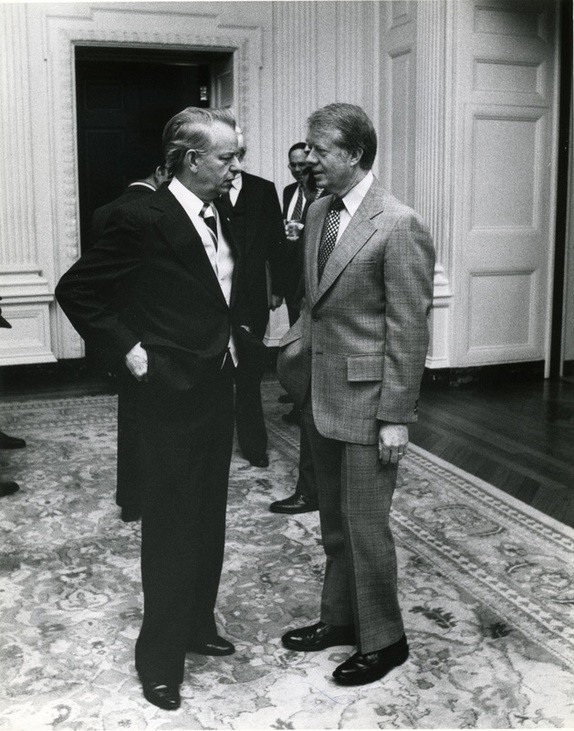|
By Jody Brumage Senator Robert C. Byrd was elected Majority Leader of the U.S. Senate in January 1977 at the beginning of the 95th Congress. In his new position of power, Senator Byrd’s focus was not only on securing necessary federal aid for his home state of West Virginia, but also on national and international affairs which required the Senate to act. Three years earlier, then Majority Whip Byrd voted in favor of imposing an embargo against U.S. ally Turkey following its invasion of the island nation of Cyprus in response to a cue led by Greek Cypriots. Claiming a violation of the 1961 Foreign Assistance Act, the Senate forced President Gerald Ford to accept the terms of the embargo, which he viewed as detrimental to any diplomatic solution to the conflict in Cyprus. In Cyprus, the three years since the Turkish invasion saw the division of the island into two states: the Republic of Cyprus, controlled by the Greek Cypriots and the Turkish Republic of Northern Cyprus, solely recognized by Turkey. In late 1974, the Republic of Cyprus had restored its leader, Archbishop Makarios III to power, but the tensions over the island territory continued to plague Cypriots in addition to global foreign policy. By mid-1978, Turkey, at the urging of the U.S., allowed for some resettlement of Greek Cypriots who had been displaced during the conflict. This action gave Majority Leader Byrd a means to bring discussion of the controversial embargo back to the floor. In an interview with CBS’ Face the Nation, Majority Leader Byrd lauded the move as a step in the right direction to easing the conflict in Cyprus. In the midst of these actions, Majority Leader Byrd had traveled as part of a delegation to numerous NATO countries, each one unanimously expressing the need to lift the embargo and to improve diplomatic relations with both Greece and Turkey. On July 25, 1978, Majority Leader Byrd along with Senators George McGovern (D-SD), Lloyd Bentsen (D-TX), and John Chafee (R-RI) proposed UP Amendment No. 1492 which ended the embargo and expressed the U.S. role in the conflict and its desire to maintain diplomatic relations with Greece, Cyprus, and Turkey. The amendment was passed by the Senate in a vote of 57 to 42. On September 26, 1978, President Carter issued a memo expressing his satisfaction with the end of the embargo and the improving conditions in Cyprus. In the nearly four decades since the Senate lifted the embargo against Turkey, the situation in Cyprus has been slow to change. The United Nations established a buffer zone between the Republic of Cyprus (Greek) and the Turkish Republic of Northern Cyprus to help decrease hostility, though the Turkish Republic is still only recognized as a sovereign state by Turkey itself. In 2014, renewed talks between the two nations of Cyprus produced a resolution seeking to end the separation of the island. The conversations between the leaders of both the Greek and Turkish Cypriots continue to address ways in which the nation can be reunified and is supported by Greece and Turkey.
Comments are closed.
|
Welcome to the Byrd Center Blog! We share content here including research from our archival collections, articles from our director, and information on upcoming events.
Categories
All
Archives
July 2023
|
Our Mission: |
The Byrd Center advances representative democracy by promoting a better understanding of the United States Congress and the Constitution through programs and research that engage citizens.
|
Copyright © Robert C. Byrd Center for Congressional History and Education
|



 RSS Feed
RSS Feed
